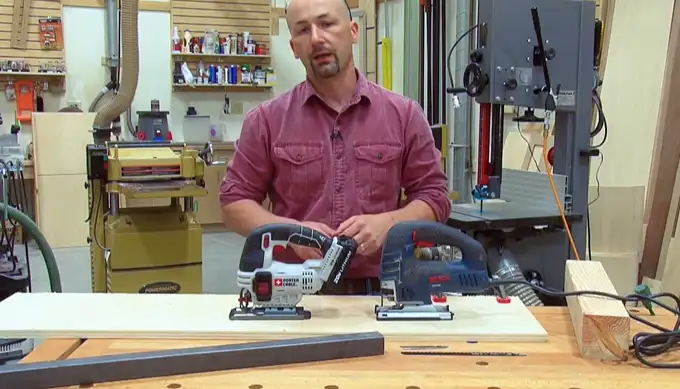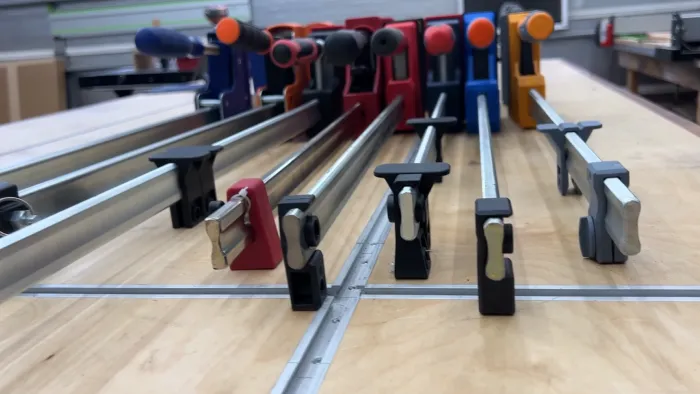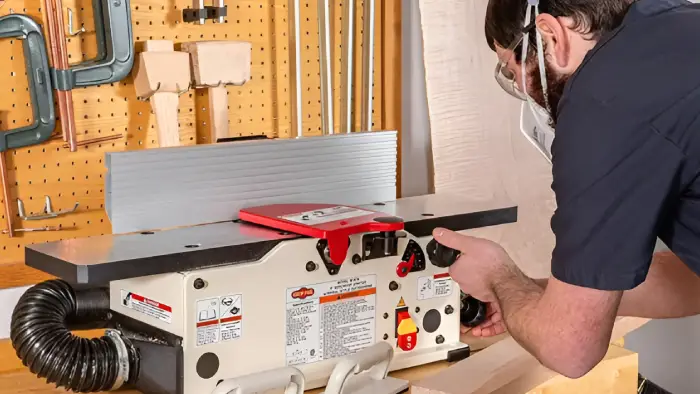WoodenuKnow.com is a participant in the Amazon Services LLC Associates Program, an affiliate advertising program designed to provide a means for sites to earn advertising fees by advertising and linking to Amazon.com and may earn from qualifying purchases.
Jigsaws are hand-held power tools, & they are one of the most versatile tools in a woodworker’s arsenal, capable of making straight, curved, or bevel cuts. But when shopping for a jigsaw, you’ll need to consider whether you should choose a corded or cordless model.
A corded jigsaw is generally more powerful and can handle tougher jobs but requires a power supply outlet and more effort. Cordless jigsaws offer increased flexibility as a power cord does not confine you. But they may not be powerful enough for some heavy-duty tasks.
Both have their pros and cons, so you should select the one that is most suitable for your needs. Find out how corded and cordless jigsaws differ to make an informed choice.
Basic Comparisons Between Corded VS Cordless Jigsaw
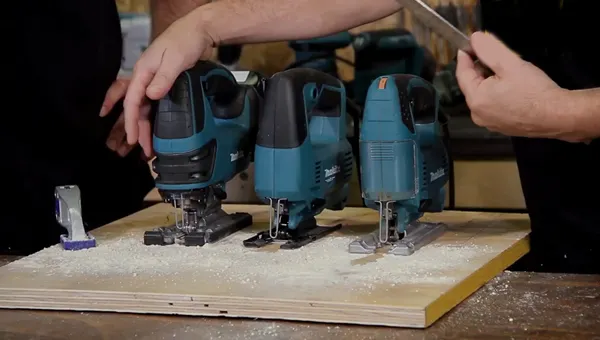
The jigsaw has a power-driven jigsaw blade, and a table on which the material to be cut is placed. They are most commonly used for making intricate cuts in wood, but they can also be used to cut metal, vinyl, plastic, and ceramic tile. Also, for straight and curved cuts, jigsaws can be used to make circular cuts.
But for perfect results, you must choose the best jigsaw that suits your needs and requirements. We have compared corded and cordless jigsaws in detail to make things easier. Let’s take a look:
Power Source
Cordless jigsaws are powered by batteries, which have a limited capacity. That means you’ll need to stop periodically to recharge the battery, which can be frustrating if you’re in the middle of a project.
Conversely, corded jigsaws are plugged into an outlet and can run as long as needed. Of course, that also means you’re plugged in, which can be inconvenient. But, corded jigsaws have more power than cordless models, thus better suited for more challenging projects.
Efficiency
A corded jig saw is the better choice because of its power and ability to handle more rigid materials. The downside is that the cord can limit maneuverability, making it difficult to reach some areas. So it can be less efficient for specific projects.
Cordless jigsaws are more convenient because you’re not hooked up to an outlet, which gives you more freedom of movement. But they may not have the power or durability to handle tougher projects as efficiently as corded models.
Power Ratings
Corded jigsaws will have a particular voltage. A corded jigsaw can be either 110/120-volt-compatible or 220/240-volt-compatible. But the voltage rating does not affect the performance of a corded jigsaw.
A reliable beginner’s jig saw with a shorter blade, intended for light-duty work, starts at around 400 watts. Using this tool will make it possible to handle softwood, drywall, plywood, and plastic.
It is common for cordless jigsaws to be rated at 12, 18, 24, or 36 volts today. The power of a 12-volt cordless jig saw is adequate for most light-duty tasks and for working with pliable materials, such as plastic and plywood.
If working with rugged materials, the cordless jigsaw must have a voltage of at least 18 volts. The latest 24 to 36 cordless jig saw models can perform almost as well as corded models.
Portability
A jigsaw’s portability is another essential characteristic. If a jigsaw is too heavy or bulky, it can be challenging to use for long periods or to maneuver around tight spaces.
Corded jigsaws are generally more powerful than cordless models, but they can be difficult to use in situations with no nearby outlet. You have to bring extra extension cords to use, which can add to the weight and bulk of your project.
Cordless jigsaws are much more convenient since they don’t require an outlet. But they can be heavier because of the battery. The newest cordless models have Lithium-Ion batteries, which are lighter and hold a charge longer than older NiCad batteries.
Although cordless jigsaws offer the freedom of movement, they don’t offer the same power or runtime as a corded model.
Working Area
If you have limited space to work in, a corded jigsaw may be the better option. Corded saws are higher-performance saws, making quick work of even the toughest materials. Also, they don’t require batteries, so you won’t be concerned about low batteries or thinking about charging your battery.
On the other hand, cordless saws offer more flexibility for tight spaces. Since they’re not tethered to a power outlet, you can take them anywhere you need. And since they run on batteries, you’ll never have to worry about being limited by an outlet’s location.
Weight
Corded jigsaws tend to be heavier than their cordless counterparts due to the weight of the cords. This can make them more challenging to maneuver, particularly for detailed work. Since we will work without the cord, lifting the saw and working with it in any position will be easy.
Cordless jigsaws are more comfortable to use since they don’t have cords that can get in the way. But they may be heavier since they contain a battery. Although this makes them easier to maneuver, especially in tight spaces, you have to lift an extra 2 to 3 pounds, which can cause fatigue.
Usage Time
If you are a professional or need to use a jigsaw daily, then a corded jigsaw is a better option. Even though it is tethered to an outlet, it will provide you with continuous power as long as you have access to an electrical outlet. Also, it can provide non-stop usage for hours with a power source.
Cordless jigsaws are best suited for those who only need to use one occasionally. Because they rely on batteries for power, they may not be able to provide the same level of power and run time as a corded model. But an extra battery can always be carried along to extend the usage time.
Price
The price of a jigsaw can vary depending on the model you choose. In general, corded jigsaws are more affordable than their cordless counterparts. Cordless counterparts require a battery, which can add quite a bit to the overall cost. Also cordless models need a battery charger.
So, deciding which jigsaw to use is a matter of personal preference and the specific needs of your project.
Recommended Uses for Corded and Cordless Jigsaw
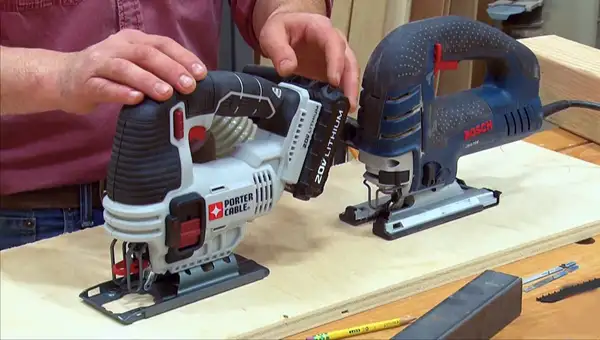
A jigsaw is a versatile tool for performing various tasks, from cutting wood to shaping metal. There are two main types of jigsaws: Corded and Cordless. Both types of jigsaws have their use recommendations based on certain factors.
Corded Jigsaws
Corded jigsaws can be used for many big and small tasks. They can be used for various tasks, such as:
01. Great for tougher materials: If you’re looking to tackle more rigid materials, a corded jigsaw is a great option. Its powerful motor can easily cut through thick wood, metal, and plastic.
One of the biggest benefits of using a corded jigsaw is its constant power source. This means you won’t be concerned about the battery running out during a project.
02. Perfect use for benchtop and workshop: Corded jigsaws are especially well-suited for benchtop and workshop use, thanks to their powerful motors and durable construction.
The workshop offers a power outlet for corded jigsaws that is always available, so there is no need for recharging batteries. Corded jigsaws also have a larger blade selection so that you can find the right blade for your benchtop project.
03. Reliable for heavy-duty tasks: Corded jigsaws can handle heavy work because they offer high power and control. Heavy-duty materials such as thick plastics and woods can be cut through quickly and easily with a corded jigsaw, and the operator has complete control over the speed and direction of the blade.
Complex cuts can be made with precision, and delicate materials can be cut without damage. Also, they are less likely to overheat than their cordless counterparts, making them ideal for extended use.
Cordless Jigsaw
A cordless jigsaw is a versatile and portable power tool that can be used for a variety of tasks:
01. Outdoor and worksite applications: Outdoor and worksite applications must stand up to tough conditions and be highly mobile. That’s why cordless jigsaws are perfect for these types of applications.
Because a power cord does not limit them, cordless jigsaws can be used anywhere, even in remote or difficult-to-reach locations. And because they’re so lightweight and portable, they can easily be transported from one job site to another.
02. Occasionally used at home: A cordless jigsaw is a convenient tool for occasional use around the house. Unlike corded saws, they can perform a wide range of jobs without needing a separate blade.
Cordless jigsaws can be used without being tethered to an outlet, which makes them perfect for occasional use, as they can be easily stored and brought out as needed.
03. Elevated areas: Cordless jigsaws are frequently used in elevated areas, such as when cutting holes for windows or doors in the second story of a building. They offer unlimited portability, making them a much more reliable option for elevated cuts.
When you use cordless jigsaws, you do not run the risk of falling if you are working on a scaffold or ceiling. There is no risk of electrocution, and they are easier to handle when working in tight spaces or corners.
Corded or Cordless Jigsaw : Tips for Choosing the Right Jigsaw
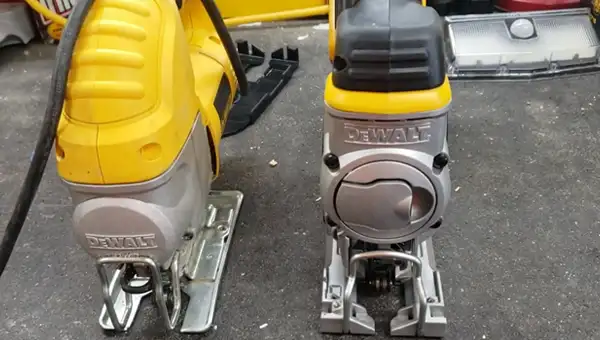
Corded and cordless jigsaws have pros and cons, so weighing your options before deciding is essential. Here are some tips to keep in mind when choosing a jigsaw:
- If you need portability, then a cordless jigsaw is the way. You’ll need to ensure the battery is charged before using it, as they can run out of power quickly.
- Cordless models offer more maneuverability but require batteries that must be regularly charged. Corded models have a power cord that limits your mobility, but they won’t run out of juice.
- Corded jigsaws are stronger than cordless ones, so if you’re planning on doing some heavy-duty cutting, this is the type of jigsaw you need. In contrast, you’ll be tethered to a power outlet, so it’s not as portable as a cordless model.
- You’ll also need to consider the size of the blade when choosing a jigsaw. A smaller blade will give you more control but also get bogged down more quickly. A larger blade can handle more material but can be more challenging to control.
Weigh up your options carefully before choosing a jigsaw, as there’s no one-size-fits-all solution. Consider what you need it for and choose the type of jigsaw that best suits your needs.
FAQs
Here are some frequently asked questions about corded and cordless jigsaws:
Q: What should I look for in a cordless jigsaw?
The voltage rating is the essential factor to consider when shopping for a cordless jigsaw. Most cordless jigsaws today have a voltage rating of 18 – 24 volts. This is more than enough power for most DIY projects and small home improvement tasks.
Q: Is a cordless jigsaw worth it?
A cordless jigsaw is an excellent choice if you prefer portability over power. Cordless jigsaws are much lighter and easier to move around than their corded counterparts, so they’re a good choice for smaller projects or for people who don’t have a lot of experience using cordless tools.
Q: How strong of a jigsaw do I need?
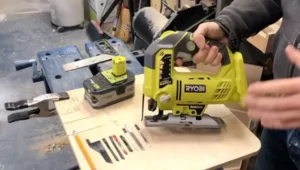
One with at least seven or eight amps of power is recommended if you’re looking for a corded jigsaw. This way, you’ll have enough ability for most materials to cut smoothly and efficiently.
If you opt for a cordless jigsaw, look for one that runs on a 20-volt battery. This will give you plenty of power and runtime to finish your project without having to stop and recharge midway through.
Q: What is a good wattage for a corded jigsaw?
A suitable corded jigsaw wattage is 400 watts. This will provide enough power to cut through most materials. Use jigsaw blades specifically designed for the cutting material to get the most out of your jigsaw.
Q: What thickest wood can you cut with a cordless jigsaw?
It depends on the specific model of the cordless jigsaw you have, but most can handle thick woods up to 1-1/2 inches thick. Some even allow for hardwoods up to 3/4 inch thick. So, it varies depending on the tool you’re using.
Conclusion
When selecting a corded or cordless jigsaw, carefully weigh your needs and options. Each type of jigsaw has its benefits and drawbacks, so choosing the one that best meets your needs is crucial. But there are some specific recommendations for specific jigsaws.
A corded saw is probably the better option if you need raw power. Cordless saws offer greater freedom of movement without being restricted by power cords. The tips described above will help you make wise purchases when shopping.
We hope this article helped you understand the primary differences between corded and cordless jigsaws to make a more informed decision when shopping for your next jigsaw.

